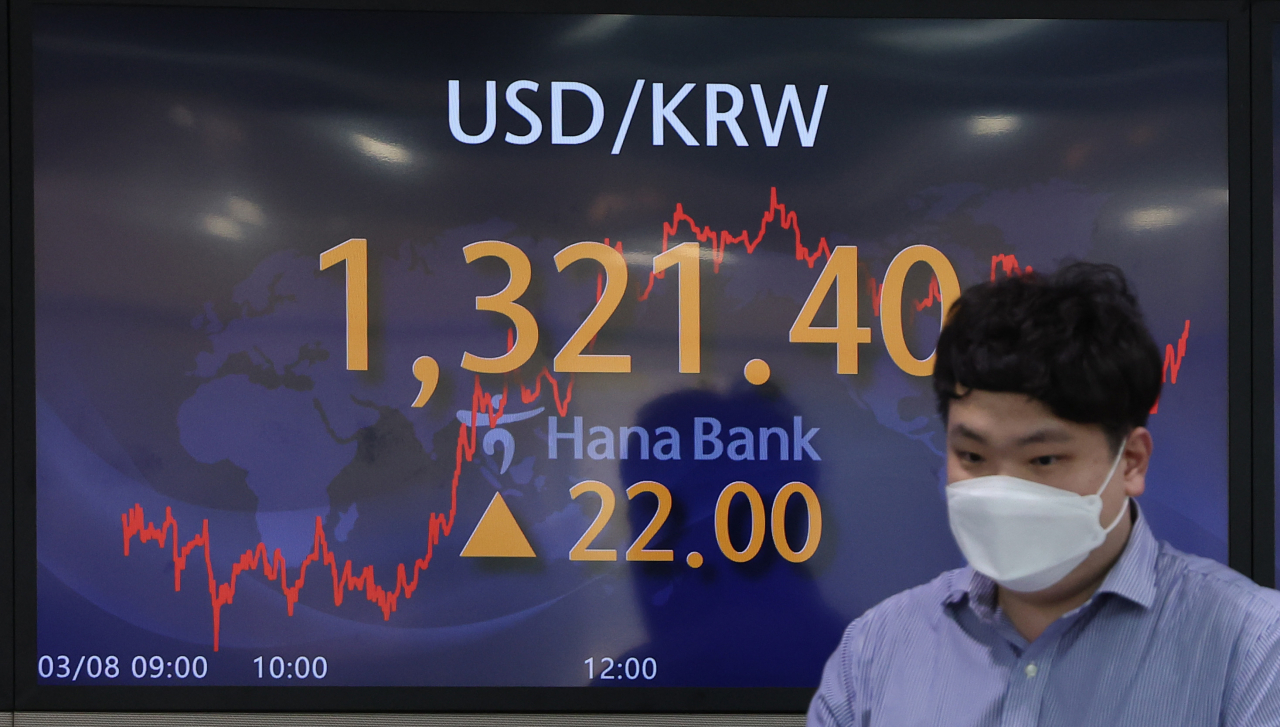Fed’s hawkish stance leaves Korea under pressure
Korean won weakens against dollar following Powell’s remarks forecasting further rate hikes
By Im Eun-byelPublished : March 8, 2023 - 15:32

Korean won weakens against dollar following Powell’s remarks forecasting further rate hikes
The US Federal Reserve's signaling of further rate hikes weighs on the Korean economy sparking fears of a widening gap between the key rates of the two countries that could cause capital outflow and increase market volatility.
US Fed Chair Jerome Powell on Tuesday hinted at a possible rate increase of 50 basis points in the Federal Open Market Committee meeting scheduled for later this month.
“The latest economic data have come in stronger than expected, which suggests that the ultimate level of interest rates is likely to be higher than previously anticipated,” Powell said in his testimony before the Senate Banking Committee.
“If the totality of the data were to indicate that faster tightening is warranted, we would be prepared to increase the pace of rate hikes,” he said.
As the market had been expecting the Fed to slow down on the pace of rate hikes considering the slow economy, Powell’s hawkish remarks sent shockwaves across the financial markets, including that of Korea.
The Bank of Korea held the base rate at 3.5 percent last month, taking a pause in its rate hike cycle which had continued for more than a year and a half. The gap between the key rates of the US and Korea went up to 1.25 percent.
If the Fed raises the key rate by 50 basis point this month, the key rate will go up from the current 4.5-4.75 percent to 5-5.25 percent, widening the gap up to 1.75 percent. This figure surpasses the previous record gap set at 1.5 percent in May-October 2000.
The widened gap leads to increased volatility for financial markets, prompting concerns of capital outflow among foreign investors and a weakened Korean currency.
Following Powell’s remarks, the Korean currency against the dollar already weakened Wednesday, closing at 1,321.4 won, up 22 won from the day before. After opening at 1,317.2 won, it remained in the 1,320-won range throughout the day.
The Korean-US currency has remained stable over the past few months after reaching its peak at 1,442 won per dollar in October. However, it rose to the 1,300-won range last month with the market expecting the US Fed to maintain its aggressive monetary tightening policy for the time being.
Korean stocks struggled amid the rate uncertainty.
Korea’s benchmark Kospi closed at 2431.91, 31.44 points lower than that of the day before, with Kosdaq at 813.95 won, 1.81 points lower. While Kosdaq managed to get back on track after opening at 809.14, Kospi did not recover from the losses.
Though it froze the key rate last month, the central bank has warned against the growing expectations on the end of the rate hike cycle.
BOK Governor Rhee Chang-yong hinted at possible rate hikes for April,
“We have to prioritize controlling inflation and financial stability rather than growth,” Rhee said at a press event held Tuesday.
But Rhee denied that Korea has to raise the rate to narrow the gap between the two countries.
"The Korea-US rate gap does not mechanically affect the currency rate and foreign capital," Rhee said, repeating the stance he has been taking in past months.
Despite worries, the market remains hopeful that the central bank will not resume its streak of rate hikes.
“Powell's remarks shed light on the concern of a possible rate hike for Korea. However, the previous judgement that the rate hike cycle is over is maintained,” NH Investment & Securities analyst Kang Seung-won said, citing the systemic risk from the gap between the key rates of the two countries to be limited.
“Though the Bank of Korea goes for a further rate increase in the second quarter amid the Fed’s prolonged monetary tightening stance, the rate hike will be a one-time event, making Korea’s terminal rate stand at 3.75 percent,” Min Ji-hee, an analyst at Mirae Asset Securities, projected.
The next FOMC meeting is scheduled for March 21-22, while the BOK's upcoming rate-setting meeting is slated to take place on April 11.


















![[KH Explains] Hyundai's full hybrid edge to pay off amid slow transition to pure EVs](http://res.heraldm.com/phpwas/restmb_idxmake.php?idx=652&simg=/content/image/2024/04/18/20240418050645_0.jpg&u=20240419100350)

